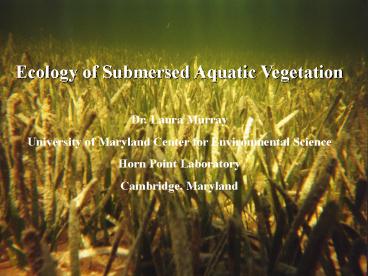Ecology of Submersed Aquatic Vegetation - PowerPoint PPT Presentation
1 / 37
Title: Ecology of Submersed Aquatic Vegetation
1
Ecology of Submersed Aquatic Vegetation Dr.
Laura Murray University of Maryland Center for
Environmental Science Horn Point
Laboratory Cambridge, Maryland
2
Outline
- What are SAV
- SAV adaptations and habitat
- III. Importance of SAV
- History of SAV decline
- Current Status of SAV in the Bay
- VI. Restoration efforts
3
- What are SAV?
- a. Roots, stems, leaves
4
b. Angiosperms (flowering plants)
5
c. Evolved from terrestrial plants
6
- d. Entire life cycle occurs underwater
7
e. Inhabit waters ranging from fresh to ocean and
tropical to boreal
Seagrasses cover 10 of the coastal oceans
0.15 global ocean 1 total biomass of
marine plants
8
- e. Dominant species of the Bay
Vallisinaria americana Wild celery Upper Bay
salinity of 0 to 5 psu
9
Potomageton perfoliatus Redhead grass
Potomageton pectinatus Sago pond weed
Mid-Bay salinity of 5 to 18 psu
10
Zostera marina Eel grass
Ruppia maritima Widgon grass
Lower Bay salinity of 18 to 35 psu
11
II. SAV adaptations and habitat
- Adaptation to an aquatic environment
- 1. Hydrophyllic pollen
- 2. Flexible tissues (little to no lignin)
- 3. Hydrodynamic design (physical stress)
- 4. No cuticle (gas and nutrient exchange)
- 5. Lacunar system
12
- Adaptations to anaerobic sediment
1. Transport of oxygen to roots via lacunar
system to maintain aerobic respiration . 2.
Utilization of alternative metabolic pathways
3. Oxidize toxic byproducts of anaerobic
sediments.
13
- SAV and light
- 1. Minimum light requirement
Dennison et al. 1992
14
2. Nutrient effect on light availability
low nutrients?low algae?increased light low
suspended particles?increased light
15
3. Sediment effect on light availability
. low wave energy /or reduced erosion?increased
light
16
d. Sediments with low organic content
5-20 organics in sediment
17
III. Importance of SAV
a. Habitat 1. Nursery ground 2. Refuge
area 3. Food for fauna
18
b. Filter
These aerial photographs were taken within
minutes of each other and the two sites are less
that 1 mile apart.
Vegetated
Un-vegetated
19
- Production
Annual production rates similar to that of
subsidized agriculture 10-25 g C/m2/yr.
20
SAVs are an important component of the Bay
ecosystem
21
IV. History of SAV decline a. Global
22
b. Local
Solomons Island 1950
Solomons Island 1979
23
c. Chesapeake Bay
24
Reasons for disappearance
- Increased nutrients
- 2. Increased sediments
- 3. Degradation of habitat
25
Nutrient enrichment
Control
Low
High
Medium
26
Sedimentation
27
Bridge Project 27
Habitat Loss
28
V. Current Status of SAV in Chesapeake Bay
29
(No Transcript)
30
- a. Establish criteria for habitat
- b. Expand criteria
- c. Monitor sites
- d. Propagate plants
- e. Plant SAV
- f. Monitor
V. Restoration Efforts
31
Chesapeake Bay Habitat Requirements SAV
Restoration To One Meter Depth
- Secchi depth gt1.0 m (light)
- Light attenuation coefficient lt1.5 (Kd) m-1
- Total Suspended Solids (TSS lt15 mg/l)
- Phytoplankton (Chlorophyll a lt15?g/l)
- Nitrogen (lt10.71 ?M)
- Phosphorus (lt0.01 mg/l)
- Critical life period April-October
- Low to moderate current and waves
- From guidance for protecting submerged aquatic
vegetation in Chesapeake bay from physical
disruption Chesapeake Bay Program
32
- Expand criteria for habitat suitability using
artificial substrates
33
c. Monitor sites for one year for criteria
parameters
34
d. Propagate plants in greenhouses and classrooms
35
e. Plant SAV in suitable sites
36
f. Monitor for restoration success
37
Summary
SAVs are flowering plants
Special adaptations for living underwater
Important component of estuarine ecosystme
Declined, but have made some recovery
Restoration efforts, tricky, but can be
successful































